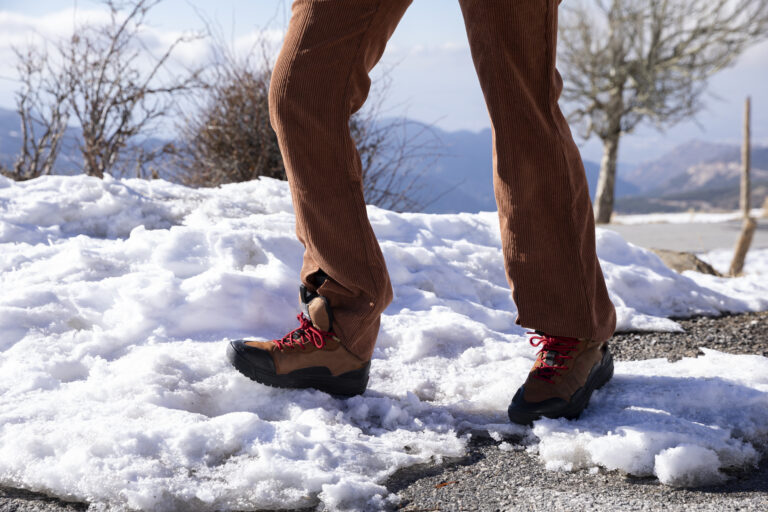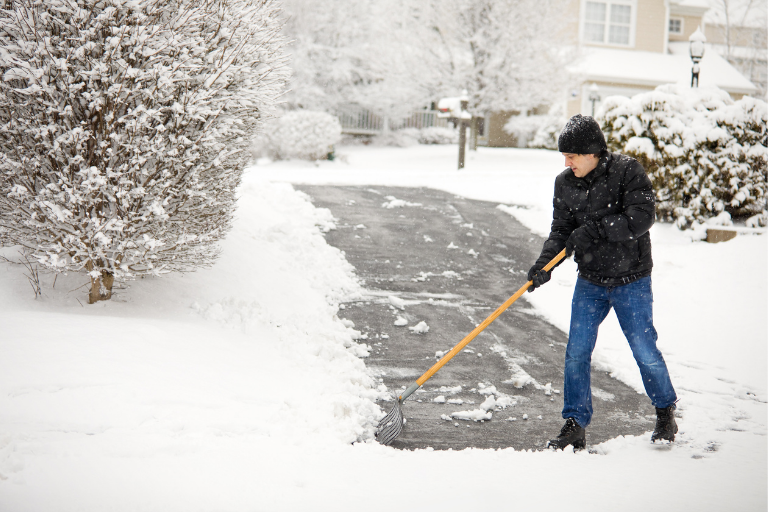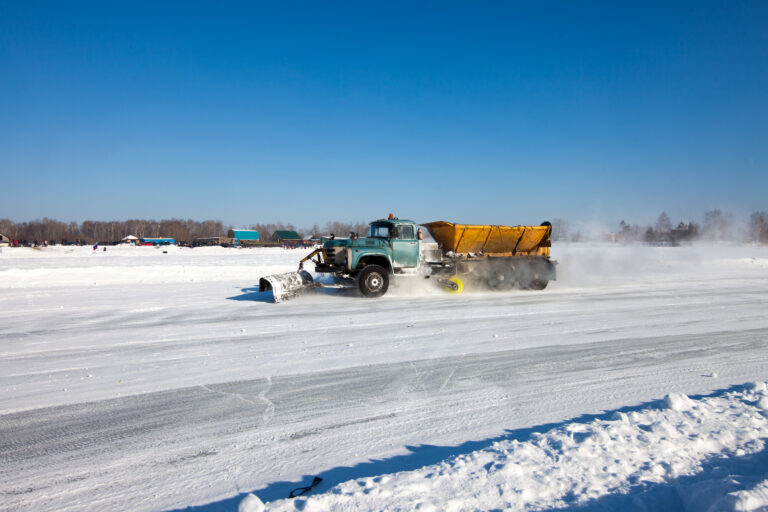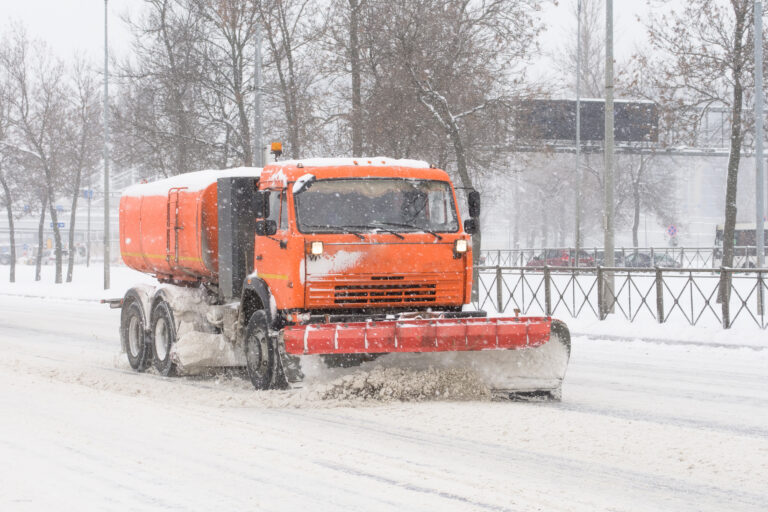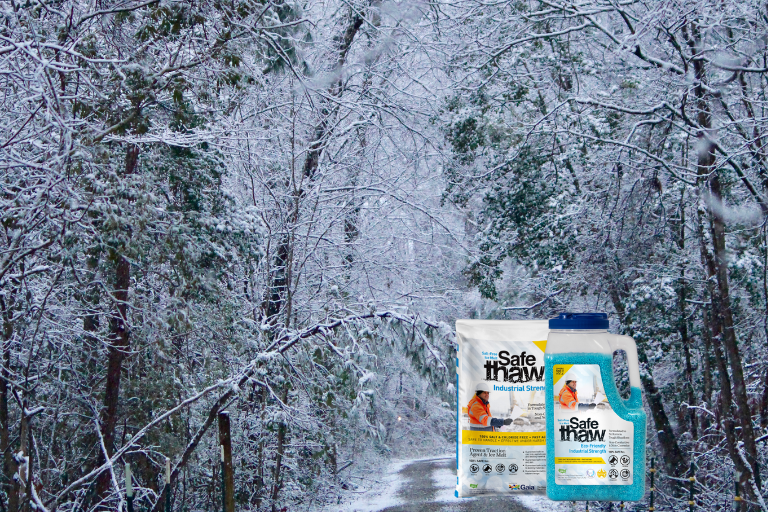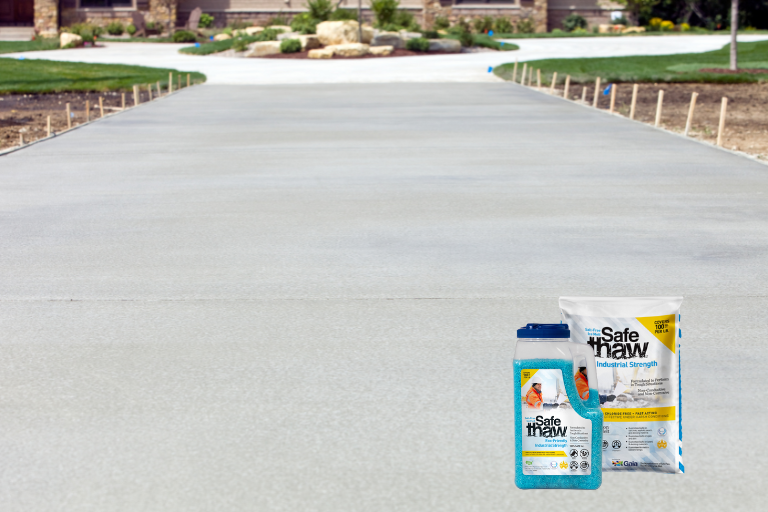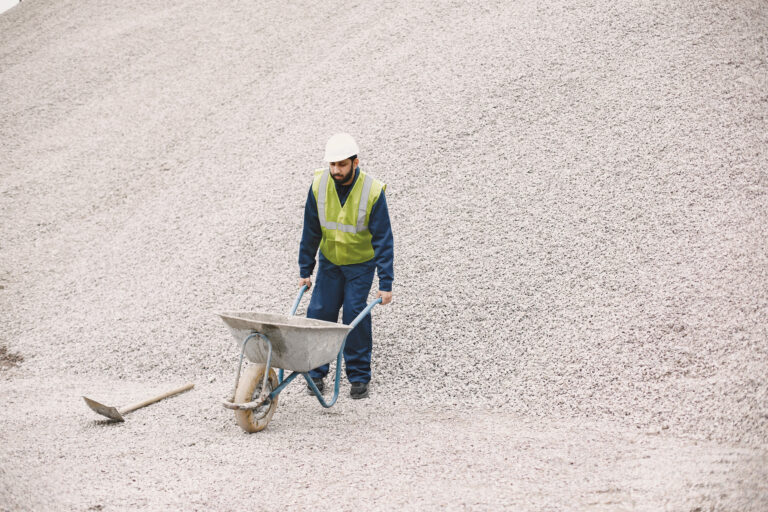How To Melt Ice On Driveway Without Salt?
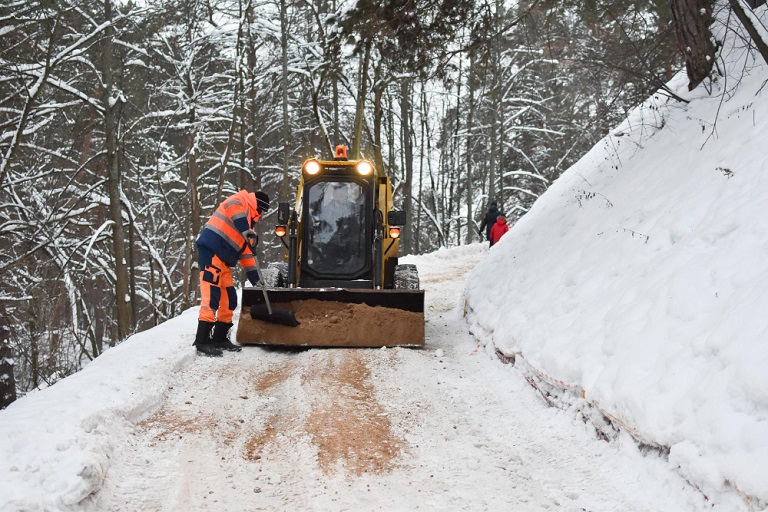
How to melt ice on the driveway without salt has been a perpetual question plaguing every commercial and residential property every winter. From buying expensive deicing products to investing heavily in external snow removal companies, a lot is going on to remove ice. So, how can you purchase a salt free ice melt, that won’t damage concrete and remain environment-friendly?

The Importance of Dealing with Ice on Driveways
Dealing with ice melt on driveways is not just about making it easier for your car to enter or exit your property. It’s also a critical step in ensuring the safety of everyone who may need to use your driveway. The icy surface can be hazardous and lead to slips and falls, which can cause severe injuries.
Using Salt for Driveways
Salt is one of the most commonly used substances to tackle ice on driveways. It’s readily available, cost-effective, and, most importantly, it works well in lowering the freezing point of water, preventing it from turning into ice. Sodium chloride, or rock salt, is a go-to choice for many households.
However, as with most solutions, it’s not without drawbacks. Salt for driveways can be corrosive, causing damage to your driveway, particularly if it’s made of concrete. Moreover, runoff from salted driveways can negatively impact surrounding vegetation and infiltrate local water sources.
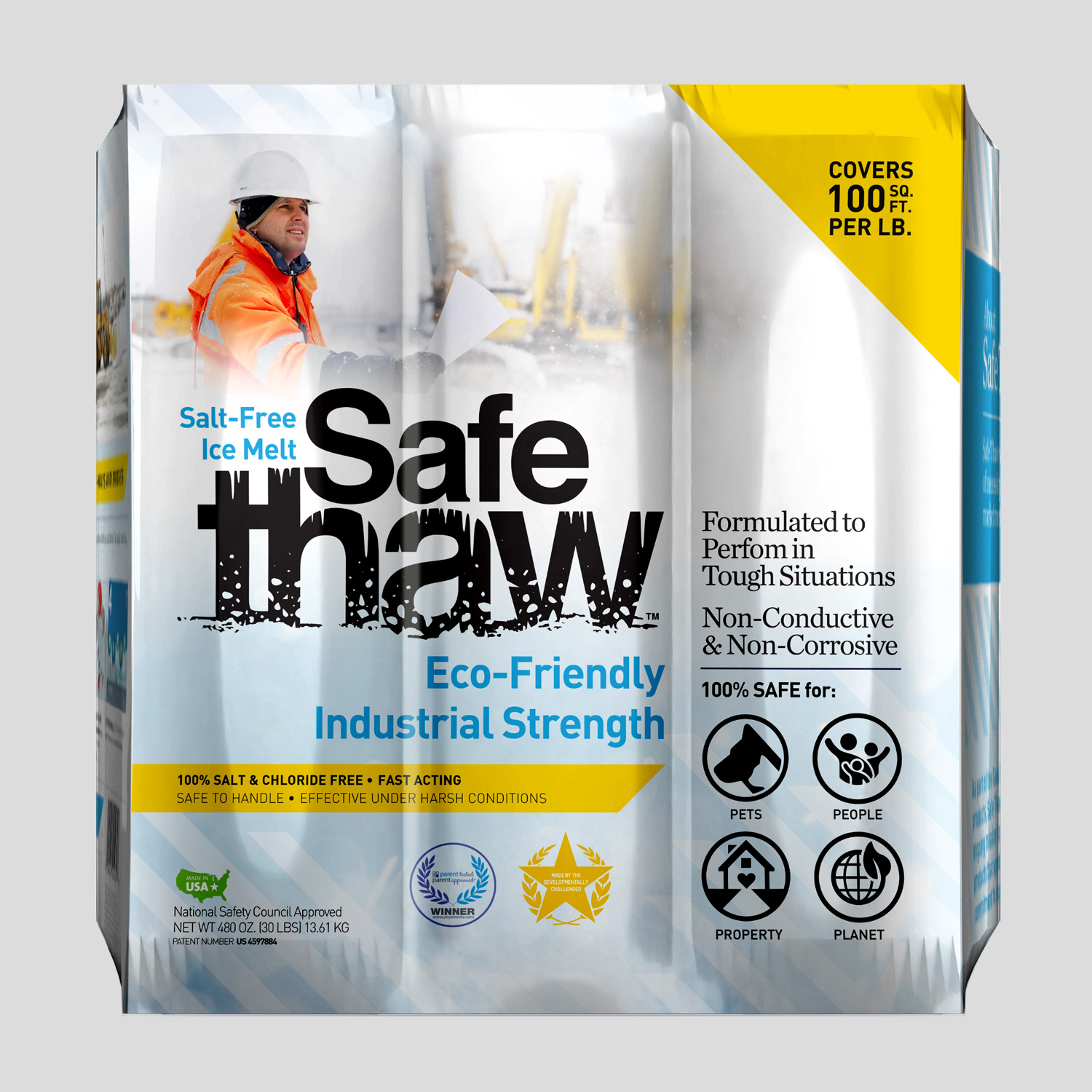
Safe Thaw
Safe Thaw was created as the ice management solution for tough winter environments. Ideal in commercial and industrial properties, shops, government agencies, bridges, and construction.
In the beginning, you may ask the most frequent, the most vital aspect of every business is its driveway. With several customers and employees frequenting different commercial locations, your driveway has to be hazard-free to ensure free vehicular and pedestrian movement.
How To Melt Ice On Driveway Without Salt?
- Sand Or Sawdust: These ingredients are freely available in the market and pose minimal threat to the environment and concrete. You can spread them liberally on your driveway to build ample traction to help your customers and employees move safely. They are not ice melt products but a simple traction building product.
- Ice Melt Pellets: There are several products comprising calcium chloride, potassium chloride, or even blends of different ingredients and sodium chloride used to melt ice on driveways. Many come as ice melt pellets that make them easier to spread and not be restricted to using specific equipment to apply the same.
- Hot Water: If you have a minor commercial premise, you may want to clear the ice using hot water. Hot water instantly starts acting and melts ice at a quicker pace. The moment the ice turns to water, you can easily clean it up. Hot water does tend to keep the swing area clear of ice almost immediately. However, it is slightly more time-consuming because you have to be ready with your snow removal equipment immediately.
- Natural Ice Melt Or Deicer: Natural ice melt products such as Safe Thaw comprise modified carbonyl diamide crystals and special glycols that leech out a bluish liquid from the core when they contact the icy surface. They not only break the surface tension but keep the water molecules from refreezing. It is 100% environment-friendly & salt free ice melt that does not leave any negative imprint on the environment. It is an ice melt that won’t damage concrete nor play havoc on your vegetation.
- Sharp Shovel : Using a sharp-edged shovel with an aluminum head is another way to quickly clear ice from the driveway. It might take more time but is safer than salt to clear excessive ice and snow from your driveway. You can break the surface tension by scraping or picking the icy surface to loosen the ice.
Preparing Your Driveway for Ice Melt
Preparation can be a game-changer when dealing with ice melt on driveways. Before winter sets in, seal your driveway to prevent water from seeping in. Regularly remove the snow from your driveway to prevent it from compacting and turning into ice.
100% salt & chloride-free, fast acting Ice Management Solution
Best Salt For Concrete Driveway: Why Traditional Choices Don’t Work
You might be wondering—isn’t regular salt the best salt for concrete driveway maintenance? At first glance, it feels like a logical choice. Rock salt (sodium chloride) is cheap, easy to buy in bulk, and promises quick melting power. But here’s the catch: salt doesn’t just melt ice—it also eats away at your driveway, your landscaping, and sometimes even your car. Every time snow and ice thaw and refreeze, salt accelerates the freeze–thaw cycle, leading to cracks, pits, and long-term surface damage.
That’s why homeowners and facility managers often realize too late that what looked like the best salt for concrete driveway surfaces was actually a recipe for expensive repairs come spring. Salt granules seep into porous concrete, where moisture expands when frozen, causing those spiderweb cracks we’ve all seen. And if you’re running a business, damaged concrete is more than an eyesore—it’s a liability. That’s where a chloride-free product like Safe Thaw stands apart. Instead of corroding surfaces, it leaves behind a protective layer that resists refreezing, reducing how often you need to reapply and cutting down on maintenance costs.
How To Get Rid Of Ice On Driveway Without Causing Damage
So, how to get rid of ice on driveway surfaces if salt isn’t the answer? This is where strategy matters. First, preparation goes a long way. Pre-treating your driveway before the snow even falls can save you hours of work later. Products like Safe Thaw create a kind of shield, stopping ice from bonding tightly to the concrete. That means less scraping, less chiseling, and far less frustration when the temperature plunges.
Some people try quick fixes like hot water or kitty litter, but these are temporary and often messy. Hot water melts fast but can quickly refreeze into a slick sheet, making things worse.
The more effective approach is using a driveway deicer specifically designed to penetrate ice and keep it from reforming. Safe Thaw uses a modified carbonyl diamide formula with special glycols, which not only melts the existing ice but also prevents refreezing for up to 72 hours. This means you spend less time reapplying and more time with peace of mind knowing the surface is genuinely safe for vehicles, employees, and family members.
Driveway Deicer Solutions: Separating Gimmicks From Real Fixes
Let’s be honest—there are dozens of products out there marketed as the “ultimate driveway deicer.” You’ll see bags boasting calcium chloride, potassium chloride, or blends of salts that promise fast results. While they may melt snow on driveway surfaces quickly, the side effects are what most users don’t see until later. Calcium chloride, for instance, works at lower temperatures than sodium chloride but is highly corrosive. It can etch into concrete, stain floors, and rust machinery or vehicles.
A true driveway deicer should do more than just work in the moment—it should provide protection. That’s where Safe Thaw shifts the narrative. Instead of adding to the damage cycle, it’s non-corrosive, non-conductive, and 100% chloride-free. That means it’s safe around sensitive machinery, won’t interfere with metal ramps, won’t harm decking or pavers, and won’t chew into your asphalt. In fact, Safe Thaw has become the go-to for industrial properties, government facilities, and even airports that simply cannot afford corrosion on equipment or surfaces.
Another overlooked point? Labor and efficiency. If your maintenance team has to apply deicer every few hours because the surface keeps refreezing, you’re wasting time and product. A longer-lasting solution like Safe Thaw actually reduces the total effort needed to keep large areas clear. When scaled across commercial properties or municipal projects, the savings in both manpower and material become significant.
How to Melt Snow On Driveway With Eco-Friendly Confidence?
Every winter, millions of pounds of salt-based deicers end up washing into soil and streams. The environmental cost is staggering: toxic run-off harms aquatic ecosystems, salt alters soil composition making it harder for plants to thrive, and even groundwater can become contaminated. If you’re looking to melt snow on driveway surfaces without adding to this cycle, eco-friendly alternatives are the way forward.
Safe Thaw is not just pet-safe—it’s plant-safe and environmentally responsible. Because it doesn’t contain sodium or magnesium chloride, it won’t leach harmful salts into your landscaping. That means when spring finally rolls around, you won’t find dead grass lines or stunted shrubs along the borders of your driveway. For industrial users, this benefit extends to stormwater compliance and environmental regulations, helping organizations meet sustainability goals while keeping properties hazard-free.
For homeowners, there’s an added peace of mind knowing you don’t have to choose between safety and sustainability. You can melt snow on driveway areas confidently, without worrying that your pet’s paws will burn or that residue will be tracked into the house. And because the formula uses solar-assisted melting, daylight actually boosts its effectiveness, reducing the need for excessive application.
Long-Term Driveway Protection
Ultimately, dealing with ice isn’t just about one storm—it’s about long-term driveway health. Every decision you make in winter impacts how your property looks and functions in spring and beyond. Choosing the wrong deicer may save you a few dollars today but cost thousands in repairs tomorrow. Cracks, corrosion, landscaping damage, and rusted equipment all trace back to the same source: corrosive ice melts.
And that’s the core reason Safe Thaw continues to gain traction across the US—it’s not just about melting ice, it’s about protecting everything that ice touches: the driveway, the environment, your pets, your car, and your bottom line.
So, if you’ve been struggling with the question of how to melt ice on driveway without salt, the real answer isn’t to search for the “best salt for concrete driveway.” It’s to stop relying on salt altogether and move toward chloride-free solutions that combine performance with protection.
Conclusion
Dealing with winter ice doesn’t have to be a cycle of damage, repair, and frustration. You don’t need to settle for salt that corrodes concrete or gimmicks that offer only temporary relief. By shifting your perspective—from asking what’s the best salt for concrete driveway? to asking what’s the safest, longest-lasting way to melt snow on driveway surfaces?—you’ll find that the solution has been there all along. Safe Thaw’s innovative, non-toxic, and chloride-free formula isn’t just an ice melt; it’s a long-term investment in safety, sustainability, and peace of mind.
FAQs
Try Also Our Other Winter Safety Products:
Traction Magic
Stay safe on slippery surfaces with a product that’s 100% natural and safe for pets, people, and your property. Whether it’s sidewalks, steps, or even your car’s traction, Traction Magic is the go-to choice.
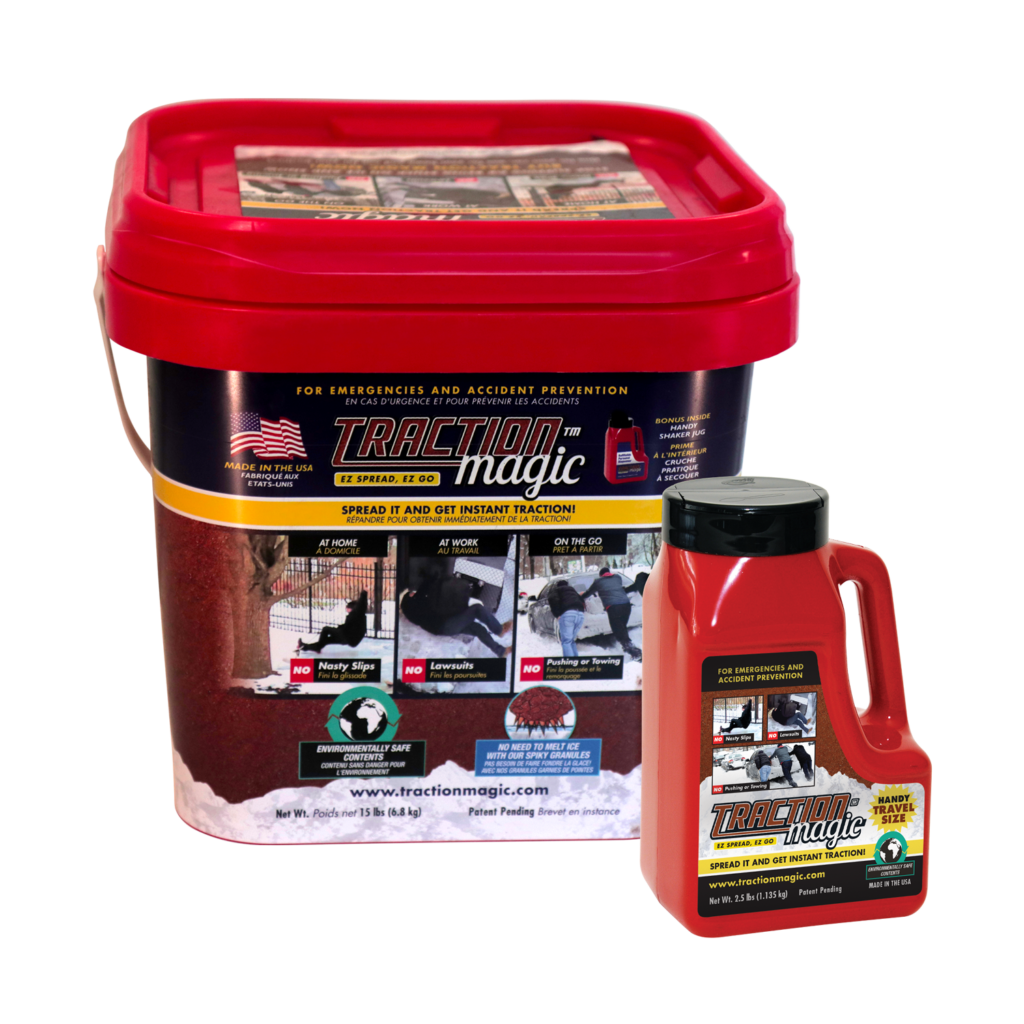
Safe Paw
The Original and #1 Selling Pet and Child Safe Ice Melt for over 20 years. Guaranteed environmentally safe –It won’t harm animals or children, and it won’t damage your property. That’s Safe Paw. Safe Paw can change how winter affects our planet.
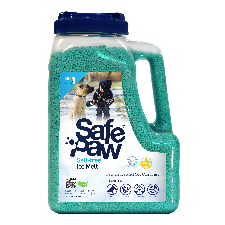
Snow And Ice Melt Management Article
-
What Are Concrete Pops and What Causes Them?
If you’ve noticed small craters, chips, or broken areas on the surface of your driveway, walkway, or patio, you might be dealing with concrete pops. These seemingly minor blemishes are…
-
Why Test Safe Paw on a Small, Inconspicuous Area First, Even on Sealed or Older Concrete?
The Importance of Testing Ice Melt Products on Concrete Surfaces Even when using products like Safe Paw and Safe Thaw, which are designed to be safe for concrete, it’s advisable…
-
Top 5 Ice Melters That Are Safe And Effective For Concrete Driveways
Alright, friends, it’s that frosty time of year again, and let’s be honest, our driveways are about to turn into mini ice rinks. We’re all on the lookout for that…
-
The Safest Ice Melt Options For Concrete Driveways
Alright, let’s settle in with our favorite winter beverage and have a down-to-earth chat about something every homeowner with a driveway ponders as the snow starts falling. You know, picking…
-
Brutal Review Of 6 Concrete-Safe Ice Melt Products For The Winter Season
As winter rolls in, it’s time to get brutally honest about the ice melts claiming to be buddies with your concrete driveway. We will dive deep into six popular products,…
-
5 Cost-Saving Tips For Installing Or Repairing Concrete Driveways
Managing the cost of concrete driveway installation or repairs can be a challenge for many homeowners. Concrete driveways are a significant investment, and ensuring their longevity while minimizing expenses is…
-
7 Essential Tips For Effective Driveway Repairs This Winter
Maintaining a driveway in winter requires strategic planning and the right tools. The need for driveway repairs can be frequent due to harsh weather conditions. In this article, we’ll explore…
-
Concrete Driveway Crack Repair: Do’s And Don’ts.
Every homeowner knows the satisfaction of a spotless concrete driveway—it just gives the house that extra touch of polish. However, Mother Nature and time ensure that cracks, those unsightly little…
-
A Beginner’s Guide To Calculating Concrete For Your Project
Understanding the precise amount of concrete needed for a project is vital for cost efficiency and ensuring structural integrity. This beginner’s guide will navigate through the process of “calculating concrete,”…
-
Understanding Concrete Calculation: Key Factors And Formulas
Concrete is the cornerstone of modern construction, providing the foundation for buildings, roads, and bridges. Accurately “calculating concrete” is a vital skill for any construction project. This comprehensive guide will…
-
What Makes The Best Ice Melt Formulas For Concrete.
As the winter months roll in, property owners grapple with the daunting task of keeping their driveways and walkways free from ice. But with a myriad of products on the…
-
How To Repair Cracks In A Concrete Driveway.
Concrete driveways. They’re robust, they’re resilient, and they give your home that polished look. But let’s face it, everything has an Achilles’ heel. For concrete, it’s those pesky cracks. One…



